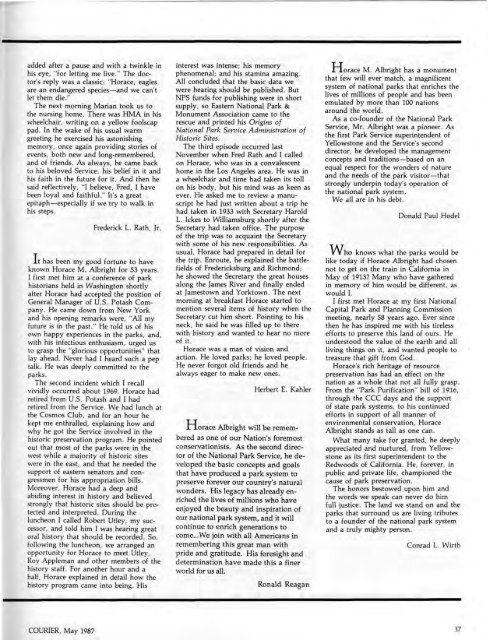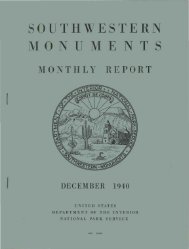Horace Albright's farewell letter to the <strong>Service</strong>upon his retirement in 1933In this letter, perhaps one of my lastofficial statements to you, let me urgeyou to be aggressive and vigorous in thefullfillment of your administrative duties.The <strong>National</strong> <strong>Park</strong> <strong>Service</strong>, from itsbeginning, has been an outstandingorganization because its leaders, both inWashington and out in the field, workedincreasingly and with high public spirit tocarry out the noble policies and maintainthe lofty ideals of the service as expressedin law and executive pronouncement. Donot let the service become "just anotherGovernment bureau"; keep it youthful,vigorous, clean and strong. We are nothere to simply protect what we havebeen given so far; we are here to try tobe the future guardians of those areas aswell as to sweep our protective armsaround the vast lands which may wellneed us as man and his industrial worldexpand and encroach on the last bastionsof wilderness. Today we are concernedabout our natural areas being enjoyed forthe people. But we must never forget thatall the elements of nature, the rivers,forests, animals and all things coexistentwith them must survive as well.I hope that particular attention will beaccorded always to that mandate in the<strong>National</strong> <strong>Park</strong> <strong>Service</strong> Act of 1916 and inmany organic acts of the individual parkswhich enjoin us to keep our great parksin their natural condition. Oppose withall your strength and power all proposalsto penetrate your wilderness regions withmotorways and other symbols of modernmechanization. Keep large sections ofprimitive country free from the influenceof destructive civilization. Keep these bitsof primitive America for those who seekpeace and rest in the silent places; keepthem for the hardy climbers of the cragsand peaks; keep them for the horsemanand the pack train; keep them for thescientist and student of nature; keep themfor all who would use their minds andhearts to know what God had created.Remember, once opened, they can neverbe wholly restored to primeval charmand grandeur.I also urge you to be ever on the alertto detect and defeat attempts to exploitcommercially the resources of thenational parks. Often projects will be formulatedand come to you "sugar-coated"with an alluring argument that the parkwill be benefitted by its adoption. We<strong>National</strong> <strong>Park</strong> men and women knowthat nature's work as expressed in theworld-famous regions in our charge cannotbe improved upon by man.Beware, too, of innovation in makingthe parks accessible. For a half century,elevators, cableways, electric railwaysand similar contrivances have been proposedfrom time to time and have beenuniformly rejected. The airplane whilenow an accepted means of transportationshould not be permitted to land in ourprimitive areas.<strong>Park</strong> usefulness and popularity shouldnot be measured in terms of merenumbers of visitors. Some precious parkareas can easily be destroyed by the concentrationof too many visitors. Weshould be interested in the quality ofpark patronage, not by the quantity. Theparks, while theoretically for everyone touse and enjoy, should be so managedthat only those numbers of visitors thatcan enjoy them while at the same timenot overuse and harm them would beadmitted at a given time. We must keepelements of our crowded civilization to aminimum in our parks. Certain comforts,such as safe roads, sanitary facilities,water, food and modest lodging, shouldbe available. Also extra care must betaken for the children, the elderly and theincapacitated to enjoy the beauty of theparks.We have been compared to the militaryforces because of our dedication andesprit de corps. In a sense this is true.We do act as guardians of our country'sland. Our <strong>National</strong> <strong>Park</strong> <strong>Service</strong> uniformwhich we wear with pride does commandthe respect of our fellow citizens. Wehave the spirit of fighters, not as adestructive force, but as a power forgood. With this spirit each of us is anintegral part of the preservation of themagnificent heritage we have been given,so that centuries from now people of ourworld, or perhaps of other worlds, maysee and understand what is unique to ourearth, never changing, eternal.The family requests that donations in Horace Albright's memory be sent to the<strong>National</strong> <strong>Park</strong> Foundation, P.O. Box 57473, Washington, DC 20037.HMA:A Towering Figure1 know I'm near the end of thetrail, but I'm not unhappy about that,for I've had a wonderful life. The <strong>National</strong><strong>Park</strong> <strong>Service</strong> has held me captive— and I know it has a great futureas well as a great past."The speaker was Horace MardenAlbright; the place was a nursing homein Studio City, California; and the datewas November 16, 1986. The words wereoffered to Herbert E. Kahler to bringback to the Conference of <strong>National</strong> <strong>Park</strong>Cooperating Associations biennialmeeting in San Diego, which would startthe next day. It was a message of praiseand hope, for Horace Albright wasalways ready to cheer the efforts of thosededicated to the <strong>Service</strong> that he helped toestablish more than 70 years before.During the next several hours on thatSunday, after labeling himself "an oldman with a good memory," HMAregaled us with <strong>Service</strong>-related stories,experiences and observations. Explaininghis early interest in history, he told usabout his brother, George Leslie Albright,an historian who made him conscious ofthe American past prior to his death in1916. It explained, he said, his growingfeeling in the years that followed that itwas important for the United States tosave the best of its historic past as wellas the best of its scenic and scientificpast.What transpired between 1916 and1933 in the <strong>National</strong> <strong>Park</strong> <strong>Service</strong> is wellknown and is covered again in his latestretrospective article: "The Birth of theIdea" in the new publication, The<strong>National</strong> <strong>Park</strong>s: The Story Behind theScenery. Less well known is the fact thatafter he left the <strong>Service</strong> in 1933 his interestnever waned. In 1934 he took timeto review the operations of the British<strong>National</strong> Trust, which in turn led to theHistoric Sites Act of 1935, anothermilestone in the history of the <strong>National</strong><strong>Park</strong> <strong>Service</strong>.Early in February this year, my wifeand I stayed overnight with HMA'sdaughter, Marian, and her husband,Roswell; and Marian, who has served asher father's confidante and amanuensis,corroborated the story that came out of aheart attack suffered by HMA in thesummer of 1986. At the end of his siege,when it was certain that he would surviveagain, he turned on his doctor and,faking high dudgeon, said, "I'm going tosue you for malpractice." To which he36 <strong>COURIER</strong>/May 1987
added after a pause and with a twinkle inhis eye, "for letting me live." The doctor'sreply was a classic: "Horace, eaglesare an endangered species—and we can'tlet them die."The next morning Marian took us tothe nursing home. There was HMA in hiswheelchair, writing on a yellow foolscappad. In the wake of his usual warmgreeting he exercised his astonishingmemory, once again providing stories ofevents, both new and long-remembered,and of friends. As always, he came backto his beloved <strong>Service</strong>, his belief in it andhis faith in the future for it. And then hesaid reflectively, "I believe, Fred, I havebeen loyal and faithful." It's a greatepitaph—especially if we try to walk inhis steps.Frederick L. Rath, Jr.It has been my good fortune to haveknown Horace M. Albright for 53 years.I first met him at a conference of parkhistorians held in Washington shortlyafter Horace had accepted the position ofGeneral Manager of U.S. Potash Company.He came down from New Yorkand his opening remarks were, "All myfuture is in the past." He told us of hisown happy experiences in the parks, and,with his infectious enthusiasm, urged usto grasp the "glorious opportunities" thatlay ahead. Never had I heard such a peptalk. He was deeply committed to theparks.The second incident which I recallvividly occurred about 1969. Horace hadretired from U.S. Potash and I hadretired from the <strong>Service</strong>. We had lunch atthe Cosmos Club, and for an hour hekept me enthralled, explaining how andwhy he got the <strong>Service</strong> involved in thehistoric preservation program. He pointedout that most of the parks were in thewest while a majority of historic siteswere in the east, and that he needed thesupport of eastern senators and congressmenfor his appropriation bills.Moreover, Horace had a deep andabiding interest in history and believedstrongly that historic sites should be protectedand interpreted. During theluncheon I called Robert Utley, my successor,and told him I was hearing greatoral history that should be recorded. So,following the luncheon, we arranged anopportunity for Horace to meet Utley,Roy Appleman and other members of thehistory staff. For another hour and ahalf, Horace explained in detail how thehistory program came into being. Hisinterest was intense; his memoryphenomenal; and his stamina amazing.All concluded that the basic data wewere hearing should be published. ButNPS funds for publishing were in shortsupply, so Eastern <strong>National</strong> <strong>Park</strong> &Monument Association came to therescue and printed his Origins of<strong>National</strong> <strong>Park</strong> <strong>Service</strong> Administration ofHistoric Sites.The third episode occurred lastNovember when Fred Rath and I calledon Horace, who was in a convalescenthome in the Los Angeles area. He was ina wheelchair and time had taken its tollon his body, but his mind was as keen asever. He asked me to review a manuscripthe had just written about a trip hehad taken in 1933 with Secretary HaroldL. Ickes to Williamsburg shortly after theSecretary had taken office. The purposeof the trip was to acquaint the Secretarywith some of his new responsibilities. Asusual, Horace had prepared in detail forthe trip. Enroute, he explained the battlefieldsof Fredericksburg and Richmond;he showed the Secretary the great housesalong the James River and finally endedat Jamestown and Yorktown. The nextmorning at breakfast Horace started tomention several items of history when theSecretary cut him short. Pointing to hisneck, he said he was filled up to therewith history and wanted to hear no moreof it.Horace was a man of vision andaction. He loved parks; he loved people.He never forgot old friends and healways eager to make new ones.Herbert E. Kahlerllorace Albright will be rememberedas one of our Nation's foremostconservationists. As the second directorof the <strong>National</strong> <strong>Park</strong> <strong>Service</strong>, he developedthe basic concepts and goalsthat have produced a park system topreserve forever our country's naturalwonders. His legacy has already enrichedthe lives of millions who haveenjoyed the beauty and inspiration ofour national park system, and it willcontinue to enrich generations tocome...We join with all Americans inremembering this great man withpride and gratitude. His foresight anddetermination have made this a finerworld for us all.Ronald Reaganllorace M. Albright has a monumentthat few will ever match, a magnificentsystem of national parks that enriches thelives of millions of people and has beenemulated by more than 100 nationsaround the world.As a co-founder of the <strong>National</strong> <strong>Park</strong><strong>Service</strong>, Mr. Albright was a pioneer. Asthe first <strong>Park</strong> <strong>Service</strong> superintendent ofYellowstone and the <strong>Service</strong>'s seconddirector, he developed the managementconcepts and traditions—based on anequal respect for the wonders of natureand the needs of the park visitor—thatstrongly underpin today's operation ofthe national park system.We all are in his debt.Donald Paul HodelVV ho knows what the parks would belike today if Horace Albright had chosennot to get on the train in California inMay of 1913? Many who have gatheredin memory of him would be different, aswould I.I first met Horace at my first <strong>National</strong>Capital <strong>Park</strong> and Planning Commissionmeeting, nearly 58 years ago. Ever sincethen he has inspired me with his tirelessefforts to preserve this land of ours. Heunderstood the value of the earth and allliving things on it, and wanted people totreasure that gift from God.Horace's rich heritage of resourcepreservation has had an effect on thenation as a whole that not all fully grasp.From the "<strong>Park</strong> Purification" bill of 1916,through the CCC days and the supportof state park systems, to his continuedefforts in support of all manner ofenvironmental conservation, HoraceAlbright stands as tall as one can.What many take for granted, he deeplyappreciated and nurtured, from Yellowstoneas its first superintendent to theRedwoods of California. He, forever, inpublic and private life, championed thecause of park preservation.The honors bestowed upon him andthe words we speak can never do himfull justice. The land we stand on and theparks that surround us are living tributesto a founder of the national park systemand a truly mighty person.Conrad L. Wirth<strong>COURIER</strong>, May 1987 37




